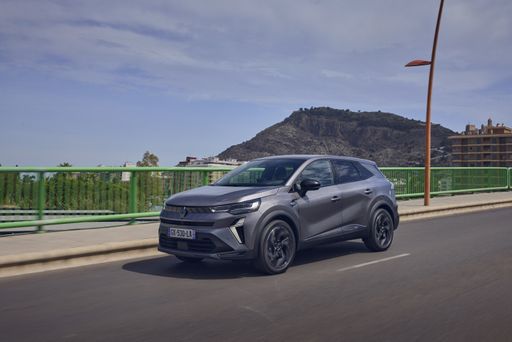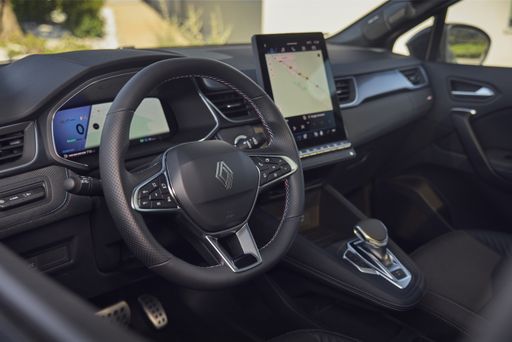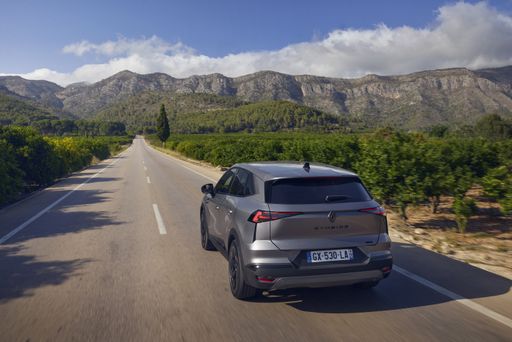Renault Symbioz vs Toyota Yaris - Differences and prices compared
Compare performance (158 HP vs 280 HP), boot space and price (24400 £ vs 21900 £ ) at a glance. Find out which car is the better choice for you – Renault Symbioz or Toyota Yaris?
Costs and Efficiency:
Price and efficiency are often the first things buyers look at. Here it becomes clear which model has the long-term edge – whether at the pump, the plug, or in purchase price.
Toyota Yaris has a slightly advantage in terms of price – it starts at 21900 £ , while the Renault Symbioz costs 24400 £ . That’s a price difference of around 2571 £.
Fuel consumption also shows a difference: Toyota Yaris manages with 3.80 L and is therefore a bit more efficient than the Renault Symbioz with 4.50 L. The difference is about 0.70 L per 100 km.
Engine and Performance:
Under the bonnet, it becomes clear which model is tuned for sportiness and which one takes the lead when you hit the accelerator.
When it comes to engine power, the Toyota Yaris has a convincingly edge – offering 280 HP compared to 158 HP. That’s roughly 122 HP more horsepower.
In acceleration from 0 to 100 km/h, the Toyota Yaris is decisively quicker – completing the sprint in 5.50 s, while the Renault Symbioz takes 9.10 s. That’s about 3.60 s faster.
In terms of top speed, the Toyota Yaris performs clearly perceptible better – reaching 230 km/h, while the Renault Symbioz tops out at 180 km/h. The difference is around 50 km/h.
There’s also a difference in torque: Toyota Yaris pulls distinct stronger with 390 Nm compared to 265 Nm. That’s about 125 Nm difference.
Space and Everyday Use:
Whether family car or daily driver – which one offers more room, flexibility and comfort?
Both vehicles offer seating for 5 people.
In curb weight, Toyota Yaris is clearly perceptible lighter – 1090 kg compared to 1359 kg. The difference is around 269 kg.
In terms of boot space, the Renault Symbioz offers significantly more room – 576 L compared to 286 L. That’s a difference of about 290 L.
In maximum load capacity, the Renault Symbioz performs decisively better – up to 1682 L, which is about 747 L more than the Toyota Yaris.
When it comes to payload, Toyota Yaris somewhat takes the win – 525 kg compared to 459 kg. That’s a difference of about 66 kg.
Who wins the race?
The Toyota Yaris proves to be wins the duel decisively and therefore becomes our DriveDuel Champion!
Toyota Yaris is the better all-rounder in this comparison.

Toyota Yaris
Costs and Consumption
View detailed analysis
Engine and Performance
View detailed analysis
Dimensions and Body
View detailed analysis
Renault Symbioz
The Renault Symbioz feels less like a traditional car and more like a rolling living room that's been told it's allowed to drive — its flowing lines and minimalist cabin are pure concept-car theatre that teases the future of everyday transport. For buyers with an eye for design and a taste for tech-forward ideas, the Symbioz is an alluring vision of what Renault could offer tomorrow, even if it's not yet a model you can park in your driveway.
details


Toyota Yaris
The Toyota Yaris is a sprightly city hatch that packs clever packaging, surprising comfort and fuel-sipping manners into a neat, easy-to-park package. It rewards sensible buyers with low running costs, friendly ergonomics and a forgiving drive, delivered with Japanese reliability and just enough personality to make errands feel a little less ordinary.
details

Costs and Consumption |
|
|---|---|
|
Price
24400 - 30700 £
|
Price
21900 - 46700 £
|
|
Consumption L/100km
4.5 - 6 L
|
Consumption L/100km
3.8 - 9.5 L
|
|
Consumption kWh/100km
-
|
Consumption kWh/100km
-
|
|
Electric Range
-
|
Electric Range
-
|
|
Battery Capacity
-
|
Battery Capacity
-
|
|
co2
102 - 136 g/km
|
co2
87 - 215 g/km
|
|
Fuel tank capacity
48 L
|
Fuel tank capacity
36 - 50 L
|
Dimensions and Body |
|
|---|---|
|
Body Type
SUV
|
Body Type
Hatchback
|
|
Seats
5
|
Seats
4 - 5
|
|
Doors
5
|
Doors
3 - 5
|
|
Curb weight
1359 - 1465 kg
|
Curb weight
1090 - 1356 kg
|
|
Trunk capacity
492 - 576 L
|
Trunk capacity
141 - 286 L
|
|
Length
4413 mm
|
Length
3940 - 3995 mm
|
|
Width
1797 mm
|
Width
1745 - 1805 mm
|
|
Height
1575 mm
|
Height
1455 - 1500 mm
|
|
Max trunk capacity
1682 L
|
Max trunk capacity
935 L
|
|
Payload
455 - 459 kg
|
Payload
289 - 525 kg
|
Engine and Performance |
|
|---|---|
|
Engine Type
Full Hybrid, Petrol MHEV
|
Engine Type
Full Hybrid, Petrol
|
|
Transmission
Automatic, Manuel
|
Transmission
Automatic, Manuel
|
|
Transmission Detail
Automatic Gearbox, Manual Gearbox, Dual-Clutch Automatic
|
Transmission Detail
CVT, Manual Gearbox, Automatic Gearbox
|
|
Drive Type
Front-Wheel Drive
|
Drive Type
Front-Wheel Drive, All-Wheel Drive
|
|
Power HP
140 - 158 HP
|
Power HP
116 - 280 HP
|
|
Acceleration 0-100km/h
9.1 - 11 s
|
Acceleration 0-100km/h
5.5 - 9.7 s
|
|
Max Speed
180 km/h
|
Max Speed
175 - 230 km/h
|
|
Torque
250 - 265 Nm
|
Torque
390 Nm
|
|
Number of Cylinders
4
|
Number of Cylinders
3
|
|
Power kW
103 - 116 kW
|
Power kW
85 - 206 kW
|
|
Engine capacity
1332 - 1789 cm3
|
Engine capacity
1490 - 1618 cm3
|
General |
|
|---|---|
|
Model Year
2025
|
Model Year
2024 - 2025
|
|
CO2 Efficiency Class
C, D, E
|
CO2 Efficiency Class
B, G
|
|
Brand
Renault
|
Brand
Toyota
|
What drive types are available for the Renault Symbioz?
The Renault Symbioz is offered with Front-Wheel Drive.




